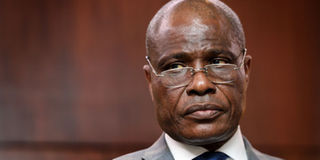Opposition deal for unity candidate in DR Congo poll hits problems

Democratic Republic of Congo's opposition politician Martin Fayulu attends a press conference on November 11, 2018 in Geneva, following his designation as joint candidate for the upcoming presidential elections. AFP PHOTO
What you need to know:
In late October, thousands of opposition supporters rallied across the country to demand the use of such machines be scrapped, chanting: "Voting machine equals cheating machine."
Plans to field a single opposition candidate in next month's presidential elections in DR Congo hit a major snag on Monday after the biggest opposition party angrily rebuffed its leader less than 24 hours after he approved the deal.
After several hundred activists protested, Jean-Marc Kabund, secretary general of the Union for Democracy and Social Progress (UDPS), announced "the grassroots want (party leader) Felix Tshisekedi to withdraw" from the deal, and set a 48-hour deadline for him to do so.
Seven opposition leaders, meeting in Geneva on Sunday, picked little-known MP Martin Fayulu as their joint candidate in the December 23 vote to succeed President Joseph Kabila, in power for 18 years.
The elections are critical for the future of the Democratic Republic of Congo (DRC), a sprawling, mineral-rich country that has never known a peaceful transition of power since independence from Belgium in 1960.
Fayulu will run at the head of a new opposition coalition called "Lamuka," a word which means "wake up" in both Lingala and Swahili, two of the country's main languages.
He will stand against Emmanuel Ramazani Shadary, a hardliner and former interior minister hand-picked by Kabila.
'Insult'
But his choice was a surprise to many as Tshisekedi, who heads the UDPS -- the country's oldest and biggest opposition party -- had widely been seen as the front-runner.
Kabund, speaking before a crowd of angry UDPS activists, said party members opposed the Geneva agreement as "they consider him (Tshisekedi) to be the candidate for the presidency."
"We don't understand how he can withdraw in favour of an unpopular candidate. For us in the UDPS, it's an insult. We say president Tshisekedi must pull himself together and return to reason."
Tshisekedi, 55, was chosen to be the UDPS' leader and election candidate in March this year after the death of his popular father, Etienne Tshisekedi, who co-founded the party in 1982.
Demonstrators gathered in pouring rain to express discontent outside party headquarters in Kinshasa, burning effigies and pictures of Felix Tshisekedi, police spokesman Pierrot Mwanamputu told AFP. Witnesses also reported seeing them burning tyres.
A similar protest took place outside the offices of the UNC, a party headed by former National Assembly speaker Vital Kamerhe who had also been flagged as a possible unity choice in Geneva.
Tshisekedi, who has a home in Belgium, has not yet returned to Kinshasa.
Earlier, Kabila's ruling PPRD party said it was "not worried" by the choice of Fayulu.
"I wonder if they will have time to prepare to face our candidate, who has a team which has been working for many months," Tunda ya Kasende, the PPRD's deputy secretary general, added.
Fayulu is one of only four opposition candidates authorised by the country's election body to run in the elections.
Two heavyweight contestants -- former warlord Jean-Pierre Bemba and ex-provincial governor Moise Katumbi -- have been barred.
To boost the chances against Kabila's choice, the opposition leaders met in Geneva to thrash out agreement on a single champion.
Voting machines
A 61-year-old former oil executive educated in the US and France, Fayulu gained prominence for his vanguard role in marches opposing Kabila's efforts to remain in power beyond his constitutional term.
But he is less popular nationally than Tshisekedi, and his Engagement for Citizenship and Development party holds just three seats in the National Assembly.
His chances may have been boosted by a storm over the planned use of South Korean-made electronic voting machines.
The authorities insist the technology will cut costs, prevent fraud and provide a faster tally, but critics claim they could be used to rig the election.
In late October, thousands of opposition supporters rallied across the country to demand the use of such machines be scrapped, chanting: "Voting machine equals cheating machine."
Fayulu threatened to quit the race if the devices are introduced for the vote, while Tshisekedi said he would run whether the machines are used or not.




